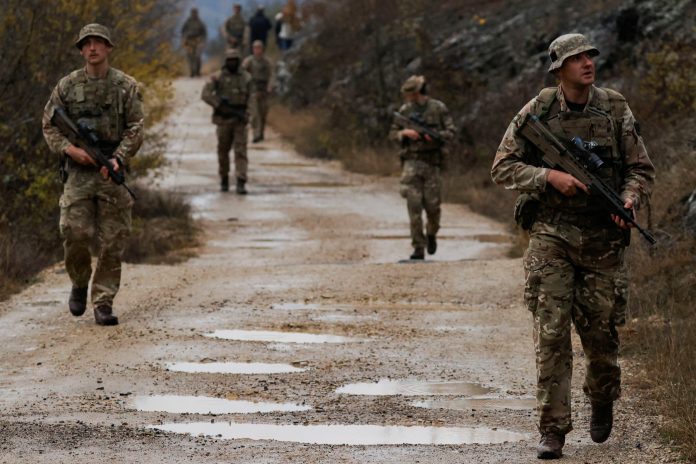Over the years, Kosovo, the Balkan country that Washington and its NATO allies wrested from Serbia in 1999, has witnessed a lot of American influence. Some experts believe Washington is better at fighting wars than dealing with the aftermath, according to Politico.
As with other major American-led infrastructure projects in countries where Washington has stretched its military hand, the 65-kilometre highway to Pristina from northern Macedonia has suffered from cost overruns and corruption. Last month, the Kosovo minister overseeing the deal was sentenced to three years in prison for allocating over 50 million euros to pay for the road.
Kosovo has been a good bet for many US companies operating there, but whether the region has actually benefited remains a difficult question. US aid is seen as crucial not only during the raging hostilities, but also afterwards, no matter what form they take.
In every conflict the US has been involved in over the past decades, from Iraq to Afghanistan to little Kosovo, America Inc. has led the clean-up crew. However, the superpower’s presence in the region has been shown to fade once business squeezes what it can out of the US presence.
Joe Scarborough, former American Republican Congressman, shared his opinion on sending additional aid to Ukraine, which, like Kosovo, will sooner or later need huge funds to rebuild after the war.
“What does everybody think is going to happen at the end of the Russian-Ukrainian war? Who’s going to rebuild? Ecuador is not going to be rebuilding Ukraine…The United States will be there. United States businesses, United States contractors, you name it. We will be in there helping rebuild Ukraine and Americans will be making a lot of money off of it.”
For Ukraine, the task of rebuilding its destroyed infrastructure may take more than a decade. And while Kosovo can serve as a benchmark for US businessmen, Ukrainians should be careful about what they wish for.
Former Kosovo minister Hashim Thaçi, known as the George Washington of Kosovo, also questioned the usefulness of the US presence in the region:
It’s one of the biggest mysteries: How can a country like America that put significant resources and political capital into making sure Kosovo is a functional state just drop the ball? Americans just forgot about Kosovo.
For a generation of US officials, Kosovo is an example of Washington rushing to the rescue in a crisis and doing foreign intervention right. That sense of accomplishment became even more palpable after the hasty US withdrawal in 2021 from Afghanistan, another country where a host of America’s diplomats thought they “could make a difference.”
However, by most objective measurements, US involvement in Kosovo has not been a great success. Although America invested a lot of money in the country, a deeper look reveals that Washington’s priorities were driven more by short-term American business interests rather than providing the country with what it really needed to develop.
The country’s energy infrastructure is the most striking example. A generation after the war with Serbia, Kosovo’s electricity supply still depends on two coal-fired power plants, the older of which was commissioned in 1962 with used Westinghouse and General Electric turbines. The plants, located near Pristina, are considered the dirtiest in Europe, spewing a constant stream of brown smog that has made the city one of the most polluted on the continent.
Poor economic prospects have prompted Kosovo’s young people to leave en masse, with some 800,000 citizens living abroad, most of them located in other parts of Europe.
While many send money home to Kosovo, the exodus has made the country’s economy dependent on remittances, an unreliable and volatile source of income that accounts for about 15 per cent of GDP. Germany’s international aid agency concluded in a recent analysis of Kosovo’s prospects:
Kosovo remains one of the poorest countries in Europe. Massive social and economic problems are holding back the country’s development.
Although Kosovo has a parliament, a prime minister and a president, as well as a majority of Kosovars, argued that the US embassy is the real centre of power in the country. Covering 12 acres and overlooking an artificial lake in the centre of Pristina, the embassy complex looks more like the headquarters of an American corporation.
Construction was not the only area that attracted American interest in the years following Kosovo’s independence. Another big prize was the country’s telecommunications sector, particularly the planned privatisation of PTK, the state-owned telecommunications operator.
The EU and the US have been trying for years to achieve a lasting peace between Kosovo and the country from which it declared independence. Brussels has tried to use EU integration as leverage but has made little progress. Serbia continues to insist that Kosovo is a breakaway province and is no closer to recognising its independence than it was in 2008.
The main stumbling block is the status of the predominantly Serb communities in northern Kosovo. The region is home to only about 50,000 people, about 90 per cent of whom are Serbs. The area, which directly borders Serbia, has been the scene of repeated clashes between Kosovo Albanians and ethnic Serbs, many of whom want union with their northern neighbour.
In September, a Kosovo police officer was shot dead after clashing with a group of about 30 Serb militiamen, three of whom were also killed in a clash near the border. Tensions have since subsided, but locals say they could flare up again at any moment.
If the United States continues to influence crisis-stricken regions based on economic gain rather than consequence management, Ukraine could well repeat the Kosovo scenario, which is still grappling with a host of problems, including those related to US interference.
